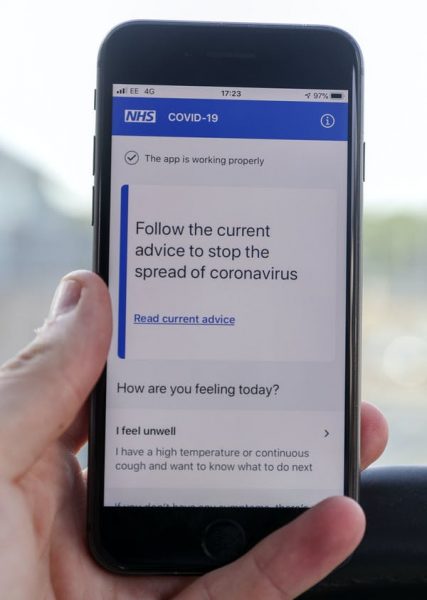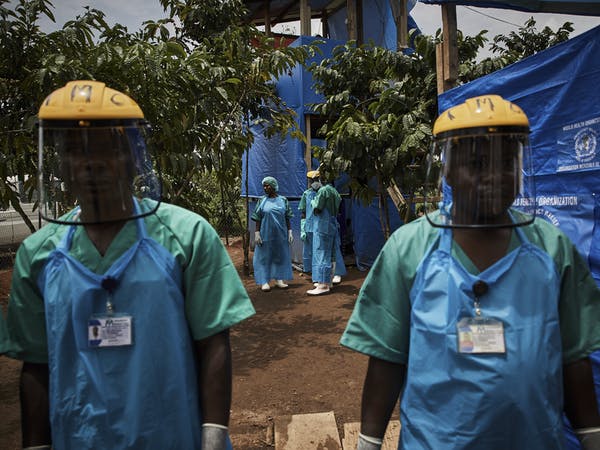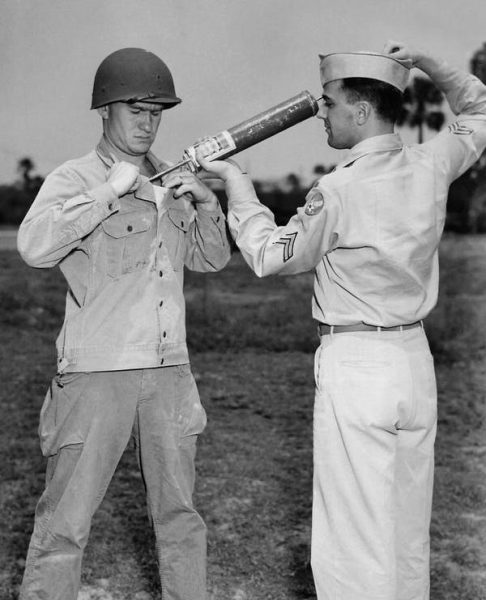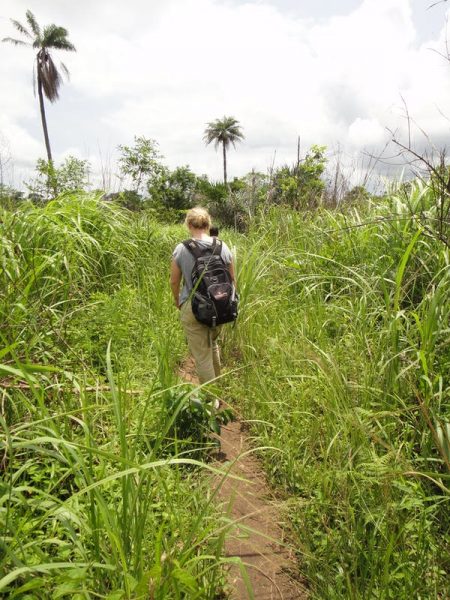By Roderick Bailey, Research Fellow, Wellcome Centre for Ethics and Humanities, University of Oxford. Originally published at The Conversation
The UK is trialling its smartphone app to assist with contact tracing. The government is full of enthusiasm and the Isle of Wight is the guinea pig. But for all the fanfare and faith in its potential, is the right kind of tracing being done? And are we missing the human touch?
The idea behind the app is for those who download it to self-report symptoms of COVID-19 and receive alerts when the phones of users who may be infected come within transmission range.

The NHS app aims to help trace all the contacts of confirmed COVID-19 cases. Steve Parsons/PA Wire/PA Images
If enough people use it, claim supporters at the University of Oxford, it can get the epidemic under control. They also assert that it offers a way of gathering and transferring data that is cheaper and faster than traditional, manual methods of contact tracing.
Those older methods typically involve health officials carrying out in-depth questioning in person or over the phone, with subsequent follow-ups, to establish, monitor and control paths of human-to-human transmission. The process is certainly resource-heavy. It can also be very slow.
But arguing for the superiority of automated tracing for reasons of cost and speed risks ignoring the significant benefits of tracing carried out by people.
The Problem with Apps
Apps may improve the quality of data sharing and analysis but have little record of decisive application to contact tracing.
Common obstacles met by phone-based technologies rolled out to tackle Ebola in West Africa, for instance, included network gaps, software problems and unfamiliarity with smartphones. Self-reporting of symptoms, meanwhile, was considered no substitute for professional, independent, in-person verification.
By contrast, manual methods of contact tracing have a rich history of accomplishment.
They contributed significantly to the eradication of smallpox and the containment of SARS. They enhance responses to sexually transmitted diseases such as HIV and remain a critical tool for tackling Ebola.

Contact tracing has been an important part of the Ebola response in countries such as DRC. Hugh Kinsella Cunningham/EPA
Why Manual Tracing Works
To understand this success, it is important to see that the benefits of manual tracing are not confined to finding people and recording their temperatures.
Of particular value is trained tracers’ ability to assess symptoms, detect asymptomatic carriers, and flag other possibilities for compromised health and onward spread, which untrained eyes – and apps – may struggle to spot.
In 2014, after three cases of Ebola were diagnosed in Texas, manual tracing identified 179 contacts. Defined as anyone who had been in physical contact with an infected case, within three feet of one for 15 minutes, or in a potentially contaminated shared space, they were found to include eight children of school age, three non-English speakers, two people with existing and serious health conditions and one person assessed to be homeless.
Manual tracing also offers a way to build trust among at-risk populations, especially when local norms, values and concerns are catered for with respect and empathy.
This can be particularly helpful in times like these, when individuals and communities in so many corners of the world are suspicious of state intentions and interventions, exposed to misinformation, or concerned about questions of confidentiality and the purposes to which data may be put.
During Allied military efforts to control a major outbreak of typhus in Naples during the second world war, teams of Italian-speaking US Army doctors joined up with local civilian nurses and priests to successfully trace dozens of cases.

Contact tracing was vital to American efforts to get typhus under control in Italy during WWII. CDC
We see further examples from Ebola to tuberculosis to HIV of vulnerable populations being more easily persuaded to comply with important control measures such as changing behaviour, sharing data and agreeing to isolation and treatment.
This can help to address, too, problems of stigma and segregation of people who are infected. Compassionate and connected contact tracers have also historically played important roles in soothing fears of positive diagnoses and supporting other aspects of mental health.
When Ebola was detected in Senegal, tracers’ demonstrable interest in contacts’ mental health and the provision of a hotline for psychological support helped foster public acceptance of containment measures.
No Easy Answers
Successful contact tracing is not easy. As the WHO observed at the height of West Africa’s Ebola outbreak:
Persons who conduct contact tracing should have investigative skills to find and track all potential contacts, and the ability to analyse the evidence. They also need to be flexible and empathic with the cases, contacts and their families in order to build trust and good community relations.

A CDC contact tracer on the trail of Ebola in West Africa, 2014. CDC
Responses to past outbreaks tell us that tracing can indeed be time-consuming and expensive. To be effective, it must also be deployed among a battery of coordinated actions including isolation, testing and the development of vaccines.
Easy answers to epidemics are rare. “You cannot sit at a desk and do it,” as Brigadier General Leon A. Fox, a US Army medical officer tasked with halting typhus’s spread across Europe, observed at the end of second world war. “It takes a lot of drive, push, fight and work.”
Contact tracing remains a proven method of breaking chains of disease transmission, and, when capacity exists, ought to occupy a central role in bringing today’s pandemic to a close. And it will be at its best if those who embrace tracing’s potential appreciate its strengths as a process driven by humans.


E-CDC guidelines for massive contact tracing say that apps can help but only as “an additional support to traditional standard contact tracing systems”. Apps cannot replace these but only help with messaging and information exchange (and here with caveats with privacy issues). If the app traces your movements and contacts via GPS or bluetooth consent to share this must be given. That will not work in many cases but in some others, it can be useful, why not? I wonder if this means duplication in personnel attending cases or not or if in some cases app data has to be complemented with telephone calls to complement data.
Thanks for this, very interesting.
I hope these arguments would get wider attention, especially in the UK, where as the author indicates the government is pushing the narrative that an app = system of tracing, with the media buying into this of course.
In addition to the general problems with apps / smartphones as highlighted by the author, the way they are starting to be implemented in the UK is rife with neoliberal infestation, incompetence, and lack of data protection. This against a background of government forcing people back to work and trying to reopen schools (which many schools and local councils are resisting).
Just to illustrate how this country seems to be a failed state in the USA category, a few articles in the Guardian today on this ‘system’ for tracking:
From ‘No one had any idea’: Contact tracers lack knowledge about Covid-19 job on the training of these tracers:
Employees told to consult YouTube for advice on how to deal with a bereaved person (…)
People hired to contact those exposed to someone with Covid-19 and advise them to self-isolate have reported spending days just trying to log into the online system (…)
New contact tracers have been told to rely on a two-page script and a list of frequently asked questions, (…)
He said he had applied for a job as a “Work at Home – Customer Service Adviser” for £10 an hour, which was advertised on the job website Indeed. (…)
He took part in a day of online training run by Sitel on Sunday, logging on to a remote system where there was one trainer for about 100 other people. “We had a chat [box] where we could ask him questions, but the first hour and a half of the training was just people writing, ‘I can’t hear anything’.” (…)
and from Serco accidentally shares contact tracers’ email addresses an example of incompetence of the company to which this has been outsourced.
And from UK plans for contact-tracing in doubt as app not ready until June a general overview, including on why contact tracing was given up on in March:
Deputy chief scientific adviser suggests track-and-trace stopped in March due to lack of capacity (…)
and on how they will push on regardless of the problems:
Signs of the growing difficulties were acknowledged by Thérèse Coffey, the work and pensions secretary on Tuesday morning. She conceded that children may start returning to primary school on 1 June before the app was ready. “I’m not aware that’s been set as a condition that’s necessary for the phased reopening of primary schools,” she said.
We’ve had someone close to us test positive here in MA. A contact tracer from the DPH in the city here called my wife. CVS has apparently gotten a federal grant/contract to do testing, the city can’t do it and has no money. They’re sending people to a neighboring town miles away to be tested. It’s hard to see this program working particularly well. Some areas seem to be off to a better start that our area. I certainly wish them all the best, but I don’t think the effort is getting the serious push from the top (either at the state or federal level) that is needed.
I also live in MA and anyone in the city I live in can be tested by presenting themselves at specific places. This is the major issue in the US: states and cities are left to their own devices given the almost complete lack of a national strategy. Therefore, hotspots are popping up all over the country depending on the level of awareness and willingness to manage the problem or fear of antagonizing the President. This means the virus will be active in this country for a LONG time to come.
Instead we have an adversarial relationship between the fed and the states (“our stockpile” “too much testing makes us look bad”). Actually the federal leadership at the highest level is breaking the cardinal rule of pandemic management: clear communication of a simple message to be repeated and refined. Instead we have “it will disappear”, bleach, hydroxychloroquine etc. Nancy Messonier gave a clear message, she is out. Fauci has been sidelined in favor of bootlicking Birx. who seems more concerned not to embarrass the President than to do her real job.
Iceland developed a voluntary app over a month ago. A large percentage of us downloaded it, but by the time it was released, physical contact tracing had already been happening for over a month, and so it was pretty much just an add-on.
According to the health authorities it has been of minimal help. An article about it appeared a couple weeks ago in MIT Technology Review.
The main takeaway:
Sad actually, MIT seems to be ground central for all this techno magic narcissism. When I went there (1973) it was just a very hard core engineering school. Focused as an under grad on the basics to a ridiculous degree of precision. At the PhD level, there were days I actually enjoyed it. Again the focus was on real problems that engineering played a role in, not the star of the whole show. I wish MIT the media lab, and other bolted on extensions would shut down and they get back to business. Climate heating is going to require a lot of focus.
Not everyone carries a phone.
The people most likely to not carry a phone, old people, are the most at risk.
There is no app for that.
It wasn’t that long ago that we were talking about putting our phones in lead lined pouches and Yves and Jeri-Lynn said they only used flip phones to avoid the sort of tracking that Snowden exposed. So now we are supposed to embrace phone tracking for a contact tracing scheme that won’t work in this country anyway?
And yes there are still lots of people who don’t have smartphones and don’t want them. I have one but don’t carry it around with me as a rule. The US is not like some Asian countries such as China or Korea where practically everyone has a smartphone.
Yeah, sounds about right. “And are we missing the human touch?” I’m guessing that would be cop tapping me on my shoulder and calling me “sir” while his partner circles around my back. Enough to make me drown my flip phone.
Google cut me off from my e-mail account yesterday giving me a message that they determined that there was suspicious activity regarding my account access. They want me to verify that I am me by giving them my phone number so I can receive a text massage with a verification code. The scum figure I’m some idiot millenial that just gives out his phone #, DOB and SS# willy nilly. Not…going…to…happen!
Indeed, I also have reached the age of “statutory senility”, but I can still find the entrance to my cave without the need for an “app.”
A big difference with tracing apps in the west is that people have learnt that they have been abused by these apps and have had their privacy violated so many times, that there is a large element of mistrust towards “high tech” solutions. You see this with people not even wanting to pick up their phones to unknown callers (the tracers here) as their phone numbers have been sold to scammers and hucksters left, right and center just like with their email addresses.
So human tracers properly done does make a lot of sense. You see countries like Vietnam that have rapidly gotten on top of their pandemic and I assume that it was mostly using human tracers as Vietnam is not a country that you normally associate with high tech. These apps can help but it should be the tracers doing the heavy lifting. Having said all this, I wonder if experienced family genealogists might prove useful as tracers since by training they look for contacts in the form of neighbours, friends and the like.
Where I live in Silicon Valley – through our HMO – it has been possible for at least a month to easily get a covid test. I drive past the testing tents every day, and almost no-one has been there, even though there are hundreds of empty appointment slots online. Now those slots are being made available to the general public; people who work in high contact jobs are especially invited to have them done, and anyone with symptoms. There is no mention of cost in the invitation notices; I don’t know if you have to be referred – but in any case it is clear that they want to test a lot of people both for public safety and to get data.
But – if I had a regular job, like as a cashier at a grocery store, I would not want to be tested, in many circumstances. How would I be able to afford to take time off if I tested positive? Where would I self quarantine? And really, even someone who is well off might not want to know, since it would greatly affect what they could do. Not to mention that the test involves a truly horrible very deep nose swab.
So I think a lot of infectious people with mild and moderate symptoms are not going to be tested even if they are offered the tests conveniently and for free. They would rather not know. And I think I will be proved right, since driving past the tents over the past several days since the general invitation has been advertised, there has been no new influx of people to be tested.
I don’t believe that contact tracing will be effective in controlling and containing the pandemic at this time. Too much time has passed, the country is too large, and the job will be nearly impossible to do thoroughly. We will all just need to ride this out, however long it takes.
You know contact tracing can be dangerous work. People have been killed doing it. That’s probably why apps and technology seem like appealing things — whatever you can do from a distance. Unfortunately to really reach all the way, you have to go and see. The deepest most entrenched pockets of illness are with distressed people — the poor, the unprotected, the people stuck in war zones, or unhealthy conditions. It takes a lot of cultural sensitivity.
The reason that contact tracing was not deployed in the coronavirus pandemic in the USA is that there is no way for the connected to make a profit. The Elite are so mesmerized with the jackpot vaccine that they don’t think there is time enough to privatize public health and start milking government money like charter schools or Lexus lanes.
The tragedy is that a coronavirus vaccine may be impractical and with the reopening of the states the virus will spread into every corner of North America. The population is large and gives time for the virus to mutate. The pandemic may last for years and the survivors will regret that, despite the high monetary costs, implementing testing, tracing and isolation could have halted the spread of the virus and saved the lives of all those who are dying for no good reason. The latest projections claim between 350,000 and 1.2 million American will die by the end of this year.
The lack of a US federal public health system is the clearest signal that, in a plutocracy, profits matter more than lives. Only a working democracy can change this.